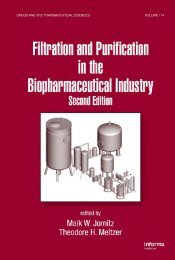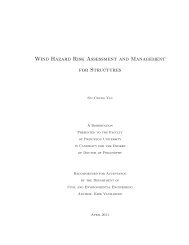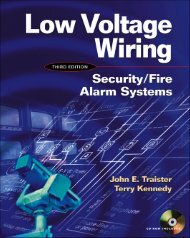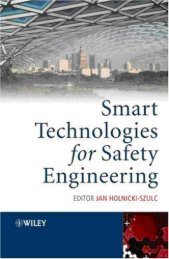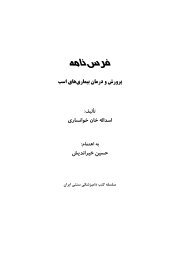Introduction to Fire Safety Management
Introduction to Fire Safety Management
Introduction to Fire Safety Management
Create successful ePaper yourself
Turn your PDF publications into a flip-book with our unique Google optimized e-Paper software.
<strong>Introduction</strong> <strong>to</strong> <strong>Fire</strong> <strong>Safety</strong> <strong>Management</strong><br />
The powers of the <strong>Fire</strong> and Rescue Service<br />
<strong>Fire</strong> and Rescue Services in England and Wales are constituted<br />
under the <strong>Fire</strong> and Rescue Service Act 2004 (in<br />
Scotland the <strong>Fire</strong> Scotland Act 2005). Under these Acts,<br />
fi re service offi cers have powers <strong>to</strong> enter and obtain<br />
information in two situations, i.e. when they wish <strong>to</strong>:<br />
➤ Obtain any information the service may need <strong>to</strong><br />
assist them in preparing <strong>to</strong> deal with fi res or other<br />
emergencies in those premises<br />
➤ Investigate the cause and spread of a fi re.<br />
However, the service may not enter as of right any<br />
premises in which there has been a fi re if the premises<br />
are unoccupied, and it was a private dwelling immediately<br />
before the fi re, unless 24 hours’ written notice is given.<br />
In the case of diffi culties, a <strong>Fire</strong> and Rescue Service<br />
offi cer may apply <strong>to</strong> a justice of the peace for a warrant<br />
authorising the offi cer <strong>to</strong> enter the premises by force at<br />
any reasonable time.<br />
Supplementary powers<br />
For the purposes of fi re investigation, a fi re service<br />
offi cer (duly authorised offi cer) may:<br />
➤ Take with him any other persons, and any equipment,<br />
that he considers necessary<br />
➤ Inspect and copy any documents or records on the<br />
premises or remove them from the premises<br />
➤ Carry out any inspections, measurements and tests<br />
in relation <strong>to</strong> the premises, or <strong>to</strong> an article or substance<br />
found on the premises, which he considers<br />
necessary<br />
➤ Take samples of an article or substance found on<br />
the premises, but not so as <strong>to</strong> destroy it or damage<br />
it unless it is necessary <strong>to</strong> do so for the purpose of<br />
the investigation<br />
➤ Dismantle an article found on the premises, but not<br />
so as <strong>to</strong> destroy it or damage it unless it is necessary<br />
<strong>to</strong> do so for the purpose of the investigation<br />
➤ Take possession of an article or substance found on<br />
the premises and detain it for as long as is necessary<br />
for any of these purposes:<br />
➤ To examine it <strong>to</strong> ensure that it is not tampered<br />
with before his examination of it is completed<br />
➤ To ensure that it is available for use as evidence<br />
in proceedings for an offence relevant <strong>to</strong> the<br />
investigation<br />
➤ Require a person present on the premises <strong>to</strong><br />
provide him with any facilities, information, documents<br />
or records, or other assistance, that he<br />
may reasonably request.<br />
298<br />
Figure 12.14 Cash box damaged by fi re<br />
It is criminal offence <strong>to</strong> obstruct a fi re service offi cer who<br />
is investigating a fi re which is liable on summary conviction<br />
<strong>to</strong> a fi ne not exceeding level 3 on the standard<br />
scale.<br />
The role of the manager in the workplace will be <strong>to</strong><br />
preserve the scene and assist the <strong>Fire</strong> Service in their<br />
investigation. Local knowledge of the workplace, staff,<br />
equipment and normal practices will assist the <strong>Fire</strong><br />
Service. A basic awareness of fac<strong>to</strong>rs affecting the initiation<br />
and growth of a fi re <strong>to</strong>gether with an understanding<br />
of how materials react <strong>to</strong> smoke and heat will enable<br />
the local manager <strong>to</strong> identify those issues that will be<br />
relevant <strong>to</strong> the <strong>Fire</strong> Service.<br />
Late calls – there may be circumstances when a<br />
fi re occurs that is not immediately evident <strong>to</strong> those in<br />
the workplace and is not detected by the alarm system.<br />
In the case where the fi re self-extinguishes it may be<br />
that it is discovered at some time after the event. In this<br />
case the local manager will inevitably conduct the initial<br />
investigation <strong>to</strong> establish that there had in fact been a<br />
fi re. In these circumstances the <strong>Fire</strong> Service should be<br />
notifi ed by the normal method. <strong>Fire</strong> Services will treat<br />
these events as ‘late calls’ and will normally respond<br />
with a single offi cer who will take the necessary details<br />
<strong>to</strong> complete the required fi re report form.<br />
12.5.1 Health and safety when investigating<br />
As with any investigation, ensuring that those at the<br />
scene of the investigation are kept safe must be seen as<br />
a priority. The decomposition of materials and potential<br />
release of chemicals, asbes<strong>to</strong>s and contaminated water<br />
must be guarded against, as should the threat of falling<br />
or collapsing materials caused by destabilisation of<br />
building structures, etc.



